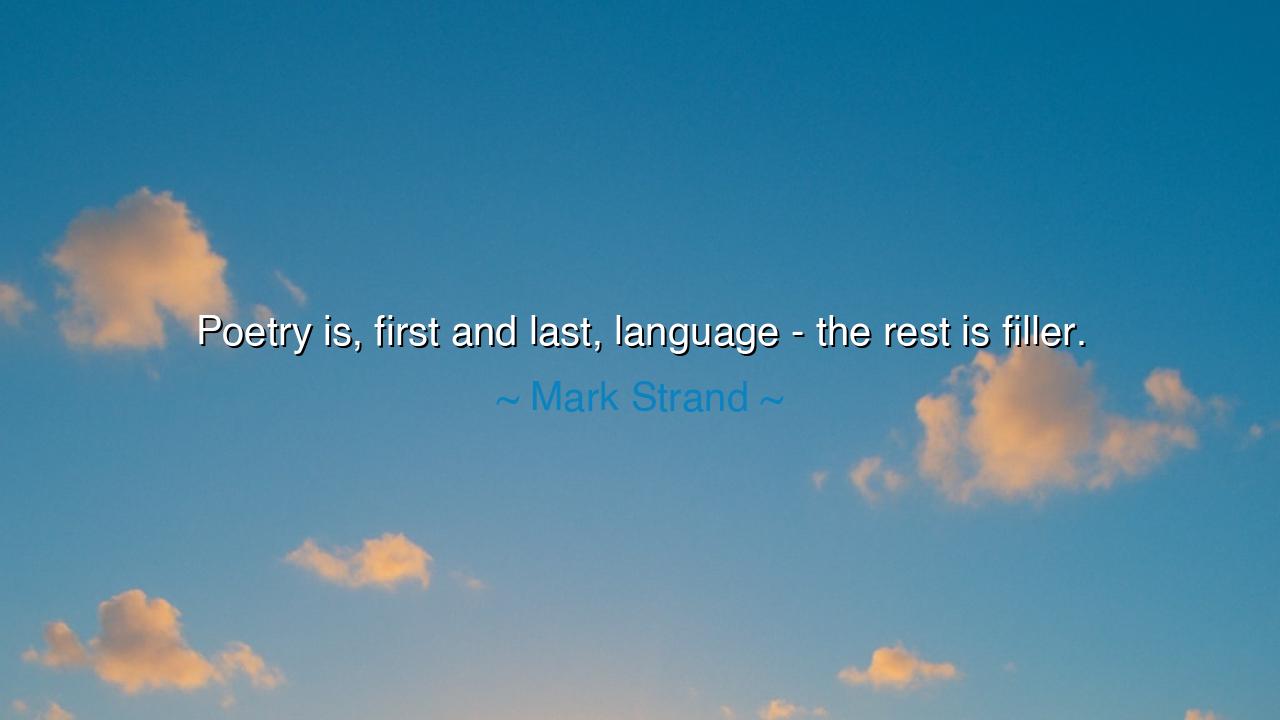
Poetry is, first and last, language - the rest is filler.






“Poetry is, first and last, language—the rest is filler.” Thus spoke Mark Strand, poet of clarity and restraint, who sought to strip away the unnecessary until only the purest essence of art remained. In this sharp declaration, he reminds us that poetry is not about decoration, nor about sentiment, nor even about ideas in themselves. It is about language—its music, its rhythm, its power to shape thought and stir the heart. All else, he tells us, is mere adornment, a shell without the living seed.
The meaning of this saying rests on the recognition that language is not merely a vehicle for poetry—it is poetry’s very substance. Just as marble is to sculpture, or pigment to painting, so words are the material from which the poet shapes meaning. If the words are alive, if they are chosen with care and rhythm, the poem will endure. If they are lifeless, no amount of emotion, philosophy, or narrative can redeem them. In Strand’s vision, the poet is first and foremost a master of language; without this mastery, all else is “filler.”
The origin of this conviction lies in Strand’s own poetic practice. Known for his precise, often spare verse, he resisted ornamentation and grandiosity. His work carried a quiet intensity, using the simplest words to evoke mystery and presence. He followed in the tradition of poets like William Carlos Williams, who declared “no ideas but in things,” grounding poetry in the exactness of word and image. Strand’s statement is an echo of this lineage: a call to honor words themselves, rather than drowning them in excess.
History gives us many examples of the truth of Strand’s insight. Consider Haiku in Japan: a form that, in just seventeen syllables, captures an entire universe of feeling. Its power lies not in elaborate commentary, but in the precise choice of words—language distilled until it glows. Contrast this with long-winded verse from lesser poets, where words are piled upon words without life. The difference is clear: one trusts language to carry the weight, the other hides behind filler. Strand’s declaration is a sword cutting through such excess.
The lesson here is that those who would write poetry—or live poetically—must learn to revere language. Every word must be chosen as though it were a stone in the foundation of a temple. To speak carelessly is to build on sand; to speak with precision is to raise something that endures. This is not only a lesson for poets, but for all who use words, for in words we shape our relationships, our communities, even our sense of self. The poet simply reveals more clearly the power that language holds for us all.
Practically, this means cultivating attention to the words we use and the silences we allow. Read widely, savoring not only meaning but music. Write with discipline, cutting away the filler until only what is alive remains. Speak with honesty and clarity, so that your words carry weight rather than noise. Even in daily life, remember that language is not neutral—it can heal, it can wound, it can shape destinies. The poet teaches us to wield it with reverence.
Thus the teaching endures: poetry is, from beginning to end, language—alive, resonant, mysterious. All else is filler, decoration, distraction. Strand’s words are a challenge to all who write, to all who speak: do not waste language. Do not bury it beneath excess. Let it stand in its purity, for in the power of words lies the power of poetry, and in the power of poetry, the power of the human soul.






NY10CP-SN-35- Do Le Nhu Y
Strand’s view that poetry is language, with everything else being filler, makes me question the importance of form and symbolism in poetry. Can a poem truly stand on its own with only language, or does the use of metaphor, rhythm, and structure enhance its meaning? Does this reduction of poetry to just words simplify or enhance the experience of reading and writing it? How much can language alone convey without these added elements?
QHMa thi quynh hanh
Strand seems to be focusing on the idea that poetry’s essence is in language itself. Does this mean that the form and structure of a poem are secondary to the words it uses? If so, can a poem with simple language still be powerful, or is it the complexity of the language that elevates it? I wonder if Strand’s view limits the potential of what poetry can achieve, or if it reinforces its most fundamental purpose.
DTDinh Thuy
I agree with Strand’s emphasis on language being at the heart of poetry. But I also wonder how much the emotional impact or imagery of a poem contributes to the experience of language. Can a poem still be considered powerful if the language itself isn’t extraordinary, but it evokes strong imagery or emotions? I’m curious whether language alone can carry the full weight of a poem’s meaning without the added layers.
HHGiang Hoang Ha
Strand’s statement about poetry being primarily language really makes me think about how essential words are to the craft. It suggests that everything in poetry, from structure to rhythm, is secondary to the language itself. But is it possible that the ‘filler’ in poetry—like imagery or form—has a role in enhancing the power of the language? Can we separate language from all the other elements that make poetry resonate?